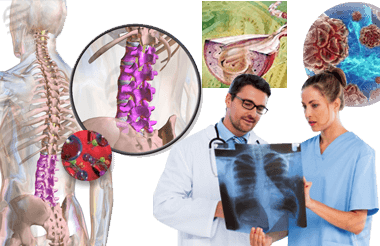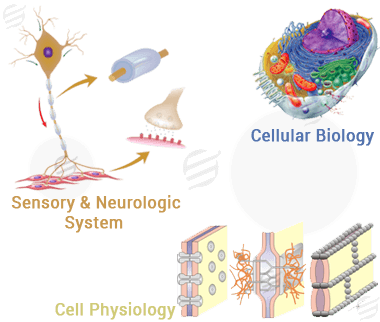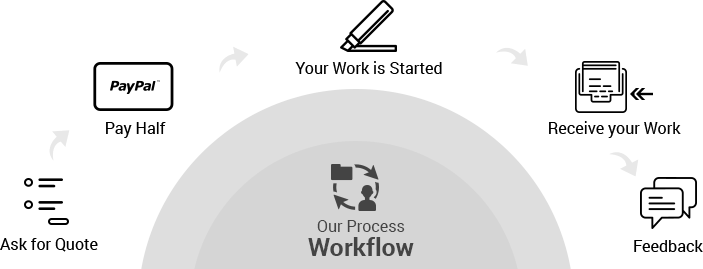Pathophysiology Assignment Help
Pathophysiology is the amalgamation of two medical terms and functions, i.e. pathology and physiology. This stream of medical science deals with certain functional changes in the physiology of the human body that occurs due to a certain illness or bodily injury. Thus, two separate streams of the medical field are involved in pathophysiology. This field of study deals with the progress of the disease by studying symptoms and their intensities. Hence, pathophysiology helps the medical practitioners to undertake proper treatment procedures depending on the symptoms and their extensions. Gaining in-depth knowledge on the pathophysiology of a disease or injury helps the doctors to identify the severity of the problem and how the patient is responding to the treatment procedure. Apart from doctors, other people involved with medical practice like nurses and medical technicians also need to understand the subject thoroughly, because the supporting medical experts like nurses can contribute their opinions regarding the current condition of patients by observing the pathophysiological condition of the patients. However, students face a lot of difficulties in executing its assignment as the topic includes many terminologies and concepts. Due to this, they fail to understand each and every aspect of pathophysiology and it results in their bad grades in the examination. Therefore, EssayCorp offers the best pathophysiology assignment help services to the students so that they can achieve good grades.
Pathophysiology Assignment Help
Pathophysiology is the amalgamation of two medical terms and functions, i.e. pathology and physiology. This stream of medical science deals with certain functional changes in the physiology of the human body that occurs due to a certain illness or bodily injury. Thus, two separate streams of the medical field are involved in pathophysiology. This field of study deals with the progress of the disease by studying symptoms and their intensities. Hence, pathophysiology helps the medical practitioners to undertake proper treatment procedures depending on the symptoms and their extensions. Gaining in-depth knowledge on the pathophysiology of a disease or injury helps the doctors to identify the severity of the problem and how the patient is responding to the treatment procedure. Apart from doctors, other people involved with medical practice like nurses and medical technicians also need to understand the subject thoroughly, because the supporting medical experts like nurses can contribute their opinions regarding the current condition of patients by observing the pathophysiological condition of the patients. However, students face a lot of difficulties in executing its assignment as the topic includes many terminologies and concepts. Due to this, they fail to understand each and every aspect of pathophysiology and it results in their bad grades in the examination. Therefore, EssayCorp offers the best pathophysiology assignment help services to the students so that they can achieve good grades.
Brief Explanation of Pathophysiology Assignment Help Topics
Pathophysiology: A Part of Nursing
A nurse plays a significant role in the treatment procedure of a patient undertaken by the visiting doctor. Apart from taking care of the patient, the nurse also records various signs and symptoms visible in the patient. Depending on the observational records of a nurse, a doctor fixes his treatment procedure and recommends medicines accordingly. That is to say, a nurse needs to be very good at detecting physical abnormalities in a patient. A professional grasp on pathophysiology helps a nurse to detect physiological abnormalities quite easily. Moreover, nurses having good knowledge and experience in pathophysiology can help a doctor in a great manner. Hospitals or any other medical facilities employing nurses possessing pathophysiological expertise also get overwhelming popularity from the citizens. Make your academic journey smooth by taking assistance from the EssayCorp that has specialized writers who provide pathophysiology assignment help to students in the UK, USA, and Australia.


Important Topics Covered by our Pathophysiology Assignment Help Experts
- Sensory and Neurological System: It is a part of the nervous system which is useful for manipulating sensory information. These systems are commonly used for recognizing vision, touch, taste, hearing, and smell.
- Cellular Biology: Cellular biology deals with the study of the structure of the cell and its function and focuses mainly on the concept that a cell is a basic unit of life.
- Cell Physiology: It is a branch of science that deals with the functions of each and every single cell. In other words, it is the activities that take place inside a cell to keep it active.
Apart from this, our pathophysiology assignment help experts also cover the topics such as body fluids distribution, symptoms of the cellular disease, reproductive function, altered elimination, cellular biology, pathology of the organelles, diabetes mellitus, renal and urinary tract, genetics, developmental disorders, alterations of sodium, potassium, and electrolytes, molecular biology of cancer, genetic disorders, and much more.
Some Important Terminologies and their Applications
- Mechanisms of Pathogenesis: It signifies a biological mechanism that helps the medical practitioners to understand the state of a disease. Sometimes more than one mechanism is applied to detect the origin, development, and progress of a disease in the human body. It also determines the 'state' of the disease, i.e. whether it is acute, chronic, or recurrent.
- Neuropathophysiology: It is the pathophysiology of the human nervous system. Pathophysiology deals with the physical changes due to a disease or injury, in a similar way neuropathophysiology is a special branch of pathophysiology that deals with the changes or abnormalities in functionality within the nervous system due to the certain physiological problem.
- Diseases of Sensation and Motor Control: Human relies on senses to adjust with different environment or objects. But, that sense may be impaired due to different types of diseases like spinal cord injury, diabetic neuropathy, head injury, intracerebral hemorrhage, delirium, and intracranial hemorrhage, etc. On the other hand, motor control diseases are certain types of progressive diseases that damage motor neurons. Motor neurons control voluntary muscular activities that function during speaking, walking, breathing, etc. Progressive bulbar palsy, amyotrophic lateral sclerosis, progressive muscular atrophy, and spinal muscular atrophy, etc. are some of these diseases.
- Review of Autonomic NS, Trauma, Toxins & Stroke: Autonomic NS controls the muscular movements of internal organs. Trauma is a psychological response to an unwanted situation that causes mental and physical hazards. Accidents, sudden shock, natural disasters, etc. cause trauma. Toxins are the poisons derived from plant or animal body that harms one or more physical parts and organs. Stroke is the sudden death of brain cells due to interruption in blood flow to the brain.
- Reproductive Pathophysiology: It is the branch of pathophysiology that deals with the functional changes and disorders in reproductive organs in humans especially in the female reproductive organ. Disorders of the female reproductive system can arise due to disease in the ovaries, the uterus, the fallopian tubes, the cervix, the vagina, or the breast.
- Male and Female Reproductive Function: Male or female reproductive functions are different. The male reproductive system produces sperm to fertilize an egg available in the female reproductive system, whereas the female reproductive system produces eggs and also protects the embryo until birth.
- Pregnancy and Infertility: After an egg is fertilized in a female reproductive system, it takes almost nine months to develop an embryo and separate out from the mother's body. This whole process of development of the embryo into a fetus is called pregnancy. Infertility is the inability of a woman to conceive even after getting sufficient sperm over a period of time.
- Diseases of Digestive System: Various diseases affect the human digestive system. Many symptoms may indicate problems in the GI tract, such as blood in the stool, bloating, constipation, etc. Diseases in this part may be acute, chronic, or repetitive in nature. Diseases like GERD, Gallstone, Crohn's disease, Celiac disease, Irritable Bowel Syndrome, Ulcerative Colitis, and Anal Fissure, etc. are frequently occurring diseases in the digestive system. The pathophysiology assignment help by EssayCorp covers a lot of important topics that help students to achieve superb grades.
- Diseases of the Pancreas and Liver: Pancreas is an organic gland located just below the stomach. The pancreas plays a vital role in controlling blood sugar levels. Some common diseases of the pancreas are pancreatitis, cystic fibrosis, and pancreatic cancer. On the other hand, the liver is the largest organ in the human body, which is located in the upper right portion of the human body. The liver has multiple functions in metabolism. Some common liver diseases are hepatitis, cirrhosis, and liver cancer.
- Endocrine Pathophysiology: Endocrine system relates to all the glands that produce hormones and other chemical substances that are necessary to regulate various body functionalities. These glands may sometimes perform disorderly thereby causing severe mild to severe problems in other systems. Pathophysiology for endocrine detects dysfunctional glands which are causing physical problems. For the proper understanding of pathophysiology, get the pathophysiology assignment help services by EssayCorp.
- Disorder of Growth and Metabolism: The pituitary gland in the brain secretes growth hormones, which stimulate tissues in the bones, muscles, and brain to grow with age. Growth disorders signals problem in hormonal secretion or any other diseases. On the other hand, a disorder in metabolism stems out from problems in enzymatic secretion.
- Stress and Disorders of the Adrenal Glands: The adrenal glands are located in the upper part of both the kidneys in the human body. Cortisol and sex hormones are secreted by these glands. Cortisol controls stress and many other physiological and psychological functions in the body. Disorder in adrenal glands may be due to many reasons like the effect of medicines, infections, dysfunction of other glands, etc.
- Disorders of Calcium Metabolism: This problem occurs when calcium level in the body decreases or increases remarkably. Homeostatic regulation sustains serum levels, intracellular levels, and optimal mineral content in bone. Control of calcium level takes place at three major organs bone, kidney, and the intestine through the complex combination of parathyroid hormone and vitamin D.
- Alteration in Hematological Function: Hematology is the study of different functions of blood and its effects on human health and diseases. Alternations in hematological functions occur due to certain changes in the body caused by infectious or non-infectious diseases or external injuries. Such alternations may have a prolonged effect on the normal functioning of RBC, WBC, platelets and lymph nodes, etc.
- Alterations in Cardiovascular Function: Cardiovascular system consists of heart, blood, and blood vessels. Cardiovascular function may get disrupted due to several reasons. It may be a dysfunctional heart or some other problems in blood or blood vessels. High blood cholesterol, hypertension, pulmonary embolism, etc. cause alterations in cardiovascular functions.
- Alterations in Pulmonary Function: Alterations in pulmonary functions occur due to the development of different chronic complications. Some frequent outcomes of alterations in pulmonary functions are asthma, chronic bronchitis, pulmonary fibrosis, dyspnea, etc. These kinds of health issues are often life-threatening, thus needed immediate investigation and treatment.
- Alterations in Uro-Renal Function: Dysfunctional kidney and liver are the primary causes of alterations in Uro-Renal functions. Problems in hormonal secretion, side-effects of medications, urinary infection, renal lithiasis, and aging, etc. are the primary causes of alterations in uro-renal function. In some instances, obstructive disorders may also form such disorders. Obstructions may occur due to many reasons like congenital malformations, stones, abdominal tumors, and prostate, etc.
- Alterations in Gastrointestinal Function: Primary causes of alterations in gastrointestinal function are disorders in the esophagus, stomach, and intestines. Again such disorders are primarily caused by different gastroenterology issues arise out of poor eating habits, a side-effect of medicines, pollution, and some psychological disorders. Chronic disorders in gastrointestinal function may lead to problems in the heart, liver, and kidneys. Students who wish to pursue higher education in the field can get the best pathophysiology assignment help services by EssayCorp.
- Alterations in Hepatic, Biliary, and Pancreatic Function: Alternations in hepatic, biliary, and pancreatic functions may be life-threatening. The liver performs many important functions in the metabolic system of the human body. On the other hand, the biliary tree consists of the liver, gallbladder, and bile ducts. Bile is secreted from the bile duct and reaches in the liver and gall bladder where the juice has immense importance. Pancreas also remains responsible for some endocrine function and exocrine functions. Hence, alterations in functions in all these organ systems lead to severe physiological disorders.
- Alteration in Musculoskeletal Function: A Musculoskeletal system in the human body provides the necessary protection of internal organs from injuries and also helps in the functional movement of each body part. Alterations in musculoskeletal function may occur due to fracture of a bone or damage to muscles. Different other internal disorders may result from these alterations.
- Multiple Organ Dysfunction Syndrome and Shock: Multiple organ dysfunction syndrome or MODS is a severe physiological condition when more than one organ fails to perform properly. The failure takes place with time and the condition progresses as time passes. A MODS is a process rather than a sole event. Alteration in organ function varies widely. It may be mildly dysfunctional to entirely unalterable organ failure. It also leads to a major clinical impact on the patient including mental shock and tension. Not only this, but our pathophysiology assignment help experts also cover a vast range of topics that helps students to get proper knowledge of the topic.
Pathophysiology Assignment Help by EssayCorp
Pathophysiology is a vast topic to be studied and so are the assignments that come along. This branch of medical science requires long hours of brisk study from different books, online journals, and readings to complete these assignments. This looks like a humongous task for students that make them pale enough to procrastinate. Team EssayCorp comes to the rescue for the students who find it difficult to cope up with the assignments and their tight deadlines. The medicine experts at EssayCorp are well versed with all the niche of pathophysiology assignments and they can write quality assignments on time. Contact Now!
Book Pathophysiology Assignment Help Service Today!
24*7 Student Support
Ask a Question
Get homework help anytime, anywhere!
Get an Answer
Tutors are online 24/7 to help you in any subject.
Ask Your Question to Experts



